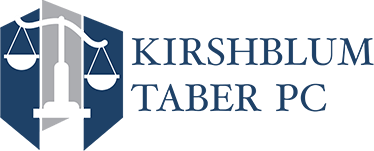
Nassau County Trusts Attorney
Protect Your Property in Suffolk County, Queens, the Bronx, Brooklyn, Manhattan, Staten Island, & Westchester County, NY
Trusts are valuable tools for protecting your estate and naming beneficiaries who will receive this property upon one's passing. Kirshblum Taber PC provides legal services for creating and understanding trusts in Nassau County, and Attorney Orly Taber, Esq. has significant experience in this specific practice area. She helps clients build trusts that safeguard their property in the future and will help you build a plan that meets your needs and interests.
Our office is conveniently located for clients throughout Nassau County, offering the personalized assistance necessary to navigate the complexities of trust law effectively. We tailor our approach to each family, ensuring that each trust not only meets your current needs but also anticipates any future challenges. Whether you're new to trusts or looking to refine an existing plan, our team is here to provide guidance and confidence every step of the way.
To speak with our experienced Nassau County trusts lawyers, call us at (516) 908-8842 or contact us online today.
Why Establishing a Trust is Essential for Your Family's Future
Creating a trust is not just about managing your assets; it’s about ensuring your loved ones are taken care of according to your wishes. Trusts offer a proactive approach to estate planning, providing peace of mind that your assets will be distributed efficiently and in a manner that aligns with your values.
Here are several compelling reasons to consider setting up a trust:
- Avoid probate: Trusts allow your estate to bypass the lengthy and often costly probate process, ensuring that your beneficiaries receive their inheritance faster.
- Maintain privacy: Unlike wills, trusts are not public documents, meaning your family's financial matters can remain confidential.
- Control over distribution: You can dictate how and when your assets are distributed, which is particularly beneficial if you have minor children or beneficiaries who may not be financially responsible.
- Tax benefits: Certain types of trusts can help minimize estate taxes and protect your assets from creditors.
- Flexibility: Trusts can be tailored to fit your unique circumstances, allowing for specific terms and conditions that reflect your personal wishes.
Having a trust can also facilitate smoother asset management if you become incapacitated, providing a clear directive for your affairs during unforeseen circumstances. This ensures continuity and stability for your family, minimizing the stress of decision-making during critical times. At Kirshblum Taber PC, our experienced attorneys will guide you through the process of establishing a trust that meets your needs and secures your family's financial future.
Schedule an initial consultation with our Nassau County trusts lawyer by calling (516) 908-8842 for more information.
What Is a Trust?
A trust is a useful estate planning tool that allows you to hold property and assets in the trust with named beneficiaries who will receive these titles in the event that you die. Trusts are advantageous for protecting your estate, and they can also help save lots of time and money as they do not have to go through the probate process. Whatever you have listed in your trust will simply go directly to the beneficiaries you have named.
Note that while trusts operate similarly to wills when it comes to transferring certain assets, you will still need to have a will for certain other decisions. For example, trusts primarily handle estate and property matters, so you will need a will to name a legal guardian if you have minor children. It is also a safe bet to have a will in case there is some property you’ve gained that you forgot to include in your trust.
Trusts provide more than just asset allocation—they can be structured to handle a variety of specific family needs. For example, educational trusts can ensure that funds are set aside for the educational expenses of your children or grandchildren, irrespective of future financial circumstances. Additionally, dynasty trusts can preserve wealth across multiple generations, safeguarding your family's financial stability long term.
Understanding the Different Types of Trusts
When it comes to estate planning, choosing the right type of trust can be pivotal in ensuring your assets are managed according to your wishes. At Kirshblum Taber PC, we understand that navigating the complexities of trusts can be overwhelming, which is why we are here to guide you through the process.
Below, we outline some of the most common types of trusts and their unique benefits:
- Revocable living trust: This type of trust allows you to retain control over your assets during your lifetime, with the flexibility to make changes as needed. It can help avoid probate and provide privacy for your estate.
- Irrevocable trust: Once established, this trust cannot be altered without the consent of the beneficiaries. It can be beneficial for asset protection and tax planning, as assets placed in an irrevocable trust are typically not subject to estate taxes.
- Special needs trust: Designed to provide for individuals with disabilities without jeopardizing their eligibility for government assistance, this trust ensures that your loved ones receive the support they need.
- Charitable trust: If you wish to support a charitable cause while also benefiting from tax deductions, a charitable trust can be an excellent option. It allows you to contribute to charity while retaining some control over the assets.
Your decision on which type of trust to establish should consider your unique financial situation, family dynamics, and long-term goals. Our team will work closely with you to assess these factors, ensuring you choose a trust that aligns with both your current objectives and future aspirations. By carefully selecting the right trust, you can maximize protections and benefits available to you and your beneficiaries.
Our experienced attorneys at Kirshblum Taber PC are committed to helping you select the right trust for your specific needs. We take the time to understand your goals and provide personalized solutions that protect your legacy. Contact us today to schedule a consultation and take the first step toward securing your family's future.
Navigating Trust Laws in Nassau County
Nassau County, like the rest of New York, is subject to specific trust laws that can influence how you establish and manage your trust. It's crucial to work with legal professionals who are thoroughly familiar with these regulations to ensure your trust complies with state laws. For instance, New York's laws require specific language and documentation when creating trusts to ensure they're legally binding and effectively protect your assets.
Additionally, Nassau County residents may face unique challenges due to local economic conditions and property values, which can influence decisions regarding asset allocation within a trust. At Kirshblum Taber PC, our attorneys are well-versed in these local nuances and can advise on strategies tailored to your circumstances. By understanding these local factors, we help our clients make informed decisions that balance current needs with future goals.
To speak with our experienced Nassau County trusts lawyers, call us at (516) 908-8842 or contact us online today.
Common Questions About Living Trusts
Understanding living trusts can be challenging, especially when determining if they’re the right choice for your estate planning needs. Residents of Nassau County often have questions about the application and benefits of living trusts. Here are some frequently asked questions and their answers to help you navigate this important aspect of estate planning.
Frequently Asked Questions
How Does a Living Trust Differ from a Will?
A living trust and a will are both legal documents that dictate how your assets will be distributed upon your death. However, they differ mainly in their application and benefits. A living trust allows you to manage your assets during your lifetime and ensures they pass directly to your appointed beneficiaries upon your death, bypassing probate. This process keeps financial matters private and expedites asset transfer. In contrast, a will only takes effect after your death and must go through probate—a public process that can delay distribution.
What Assets Can Be Included in a Living Trust?
Almost any asset you own can be included in a living trust. Common assets placed in a trust include real estate, bank accounts, stocks, bonds, and personal property. It's important to properly title assets in the name of the trust to ensure they are covered. Failure to do so may result in those assets going through probate. At Kirshblum Taber PC, we assist our clients in ensuring all appropriate assets are correctly transferred to avoid unintended consequences.
Is a Living Trust Suitable for Everyone?
While a living trust offers many benefits, it may not be suitable for everyone. Factors such as the complexity of your estate, financial situation, and estate planning goals play a significant role in determining if a living trust is the right choice. Some individuals may benefit more from other estate planning tools. At Kirshblum Taber PC, we evaluate your specific circumstances and needs to recommend the most effective strategies for securing your estate and providing peace of mind.
Secure Your Legacy with a Trust in Nassau County
There are several different types of trusts you can create, depending on your circumstances. For instance, there are living trusts that allow you to manage your trust assets during your lifetime, and there are testamentary trusts that determine the distribution of your assets after you die. These trusts can be either revocable (changed or terminated at any point during your lifetime) or irrevocable (cannot be changed once it has been established and cannot be revoked after you die).
What is an Irrevocable Trust?
One of the most important types of trusts that we handle at Kirshblum Taber PC is the irrevocable trust, which can be either an irrevocable living trust or an irrevocable testamentary trust. An irrevocable living trust is when you transfer assets to the trust while you are alive. With an irrevocable testamentary trust, you also create it during your lifetime, but it becomes part of your will and thus is administered according to the terms of your will. This type of trust may be appropriate in situations when you want to name a trustee to manage the property on behalf of a minor.
Experienced Guidance on Irrevocable Trusts in Nassau County
Trusts can be confusing and complex matters, but Kirshblum Taber PC is significantly experienced with all stages of the process, from creating a trust to understanding its terms. For legal assistance on making your irrevocable trust in Nassau County, contact Attorney Orly Taber, Esq. for informed legal counsel. Our Long Island trusts lawyer will make sure your property is being appropriately protected for your beneficiaries and that all the legal jargon meets your needs and interests.
Irrevocable trusts offer specific advantages such as asset protection from creditors and reducing estate taxes, but they require careful planning and understanding of its implications. Our legal team ensures you are fully informed about the amendments and responsibilities an irrevocable trust entails. We stay updated with the latest changes in trust law, guaranteeing that your trust is compliant with current regulations and optimally structured for your benefit.
Our Experienced Nassau County Trusts Lawyer Can Help
Creating a trust is just the first step in effective estate planning. To ensure your trust continues to meet your needs and goals, regular reviews are essential. Life changes—such as marriage, divorce, the birth of a child, or changes in financial circumstances—can impact your trust's effectiveness. Our experienced attorneys at Kirshblum Taber PC recommend scheduling a review every few years or after any significant life event.
Here are some key reasons to conduct regular trust reviews:
- Adapt to changing laws: Estate laws can change, and staying informed can help you avoid potential pitfalls.
- Update beneficiaries: Ensure that your trust reflects your current wishes regarding beneficiaries and their distributions.
- Asset management: Evaluate the assets held within the trust to ensure they align with your financial goals.
- Tax considerations: Changes in tax laws may affect your trust; regular reviews help you optimize tax benefits.
- Peace of mind: Knowing your trust is up-to-date can provide reassurance that your estate will be managed according to your wishes.
Our comprehensive review services include analyzing your current life situation, financial goals, and changes in law that may influence your trust. We provide detailed consultations to discuss any potential amendments and ensure your trust strategy remains optimal. At Kirshblum Taber PC, we are committed to helping you navigate the complexities of estate planning.
Get started today by calling our Nassau County trusts lawyer at Kirshblum Taber PC at (516) 908-8842. Schedule an initial consultation online today.


-
“David and Orly are the definition of a DREAM TEAM!!”

Dedicated and Experienced Legal Professionals
Our lawyers serving Nassau County bring a unique background of experience. Attorney David A. Kirshblum, Esq. is a retired judge who has spent over 24 years on the family court bench, including presiding over cases involving Sean “Puffy” Combs, Al Pacino, and Mick Jagger.
He has also written decisions that have been affirmed by the NYS Appellate Division. Having been on the judicial side of the law, Attorney Kirshblum has a unique perspective that can prove advantageous to strategizing against the other side.
Further, while Attorney Kirshblum handles the family law side, Attorney Orly Taber, Esq. has significant experience with estate planning and helps clients, particularly the elderly, with estate matters and ex-spouse property disputes.
She is an energetic and client-focused lawyer who helps build estate plans that safeguard your personal and material interests.
Both Nassau County lawyers at Kirshblum Taber PC are experienced and professional advocates who treat their clients with respect.
Schedule an initial consultation with our attorneys by calling (516) 908-8842 today to get started on your case.


Contact Us For a Consultation
Speak To An Attorney Today About Your Legal Matter. Call 516-908-8842 Or Fill Out the Form Below.



